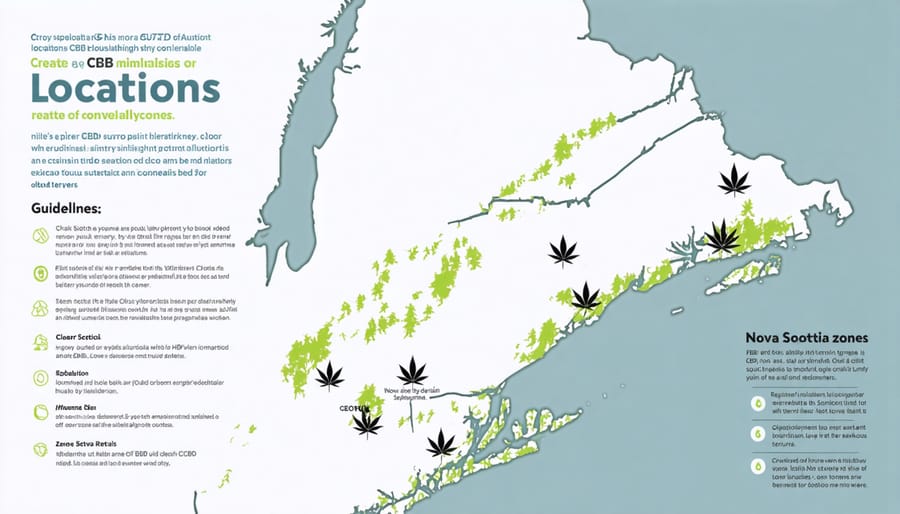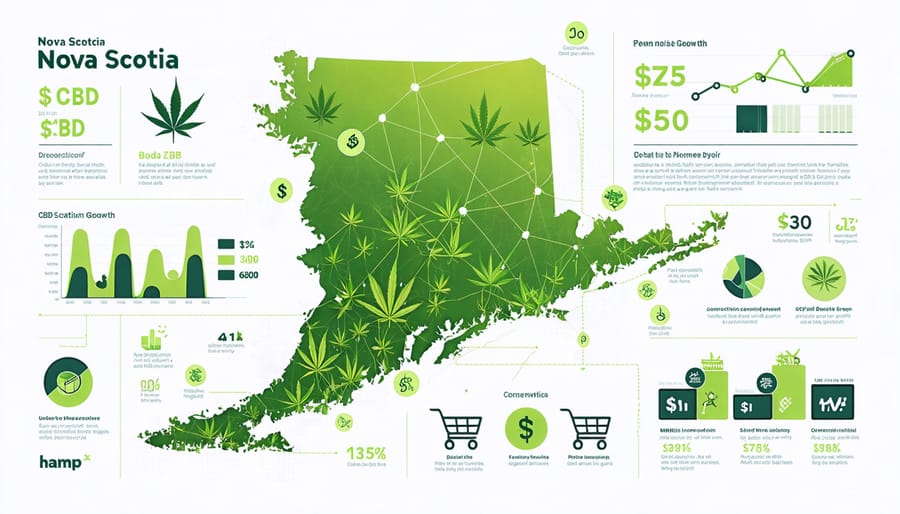Nova Scotia stands at the forefront of Canada’s rapidly evolving CBD industry, where recent legislative changes have unleashed significant economic potential across the province. As local businesses, including established retailers like Buy from CBDNorth, adapt to new regulations, the South Shore region has emerged as a hub for CBD entrepreneurship and innovation. The province’s strategic approach to CBD legislation has created over 1,200 new jobs since 2020 and generated an estimated $45 million in annual revenue, transforming both urban centers and rural communities. For local business owners and consumers alike, understanding these regulatory frameworks and their economic implications has become crucial for navigating Nova Scotia’s burgeoning CBD marketplace. This comprehensive analysis explores how recent legislative developments are reshaping our local economy and creating unprecedented opportunities for South Shore entrepreneurs.
Nova Scotia’s CBD Landscape: Current Legal Framework
Provincial Regulations
In Nova Scotia, CBD products are regulated through a combination of federal and provincial frameworks. The province’s new CBD regulations establish specific guidelines for retail sales, distribution, and quality control. Licensed retailers must obtain permits from both the Nova Scotia Liquor Corporation (NSLC) and Health Canada before selling CBD products.
The province maintains strict quality testing requirements, with all CBD products requiring third-party laboratory verification before reaching store shelves. Retailers must also comply with provincial advertising restrictions, which limit promotional activities to in-store displays and approved educational materials.
Local businesses selling CBD products must maintain detailed inventory records and submit regular reports to provincial authorities. Age verification is mandatory, with sales restricted to individuals 19 years or older. Online sales are permitted but must follow additional security protocols, including age verification at delivery and secure packaging requirements.
These regulations aim to balance consumer safety with market accessibility, creating a structured environment for CBD commerce while protecting public health interests.

Federal Compliance Requirements
CBD businesses in Nova Scotia must comply with federal regulations established under the Cannabis Act and overseen by Health Canada. These requirements include obtaining proper licensing, following strict quality control measures, and adhering to packaging and labeling standards. During the initial cannabis consultation process, local businesses emphasized the need for clear guidelines that would allow them to operate effectively while maintaining public safety.
Key federal requirements include maintaining detailed production records, implementing security measures, and ensuring all CBD products contain no more than 0.3% THC. Businesses must also conduct regular testing through accredited laboratories and maintain proper documentation of their supply chain.
For Nova Scotia retailers, federal compliance means working exclusively with licensed producers and maintaining accurate inventory tracking systems. They must verify that all products meet Health Canada’s requirements for CBD content, purity, and safety before offering them for sale. These measures, while sometimes challenging for smaller businesses, help ensure consumer safety and maintain industry standards across the province.
Economic Benefits for Nova Scotia Communities

Job Creation and Business Growth
The legalization of CBD products in Nova Scotia has created a significant ripple effect across the province’s job market and business landscape. Local entrepreneurs have seized opportunities to establish CBD retail stores, with over 25 new businesses opening across the South Shore region in the past year alone.
These new ventures have generated approximately 150 direct jobs, ranging from retail positions to management roles. The expansion has also supported indirect employment in related sectors such as security, transportation, and marketing services. Industry experts estimate that for every direct CBD retail position, approximately 1.5 indirect jobs are created in supporting industries.
Small business owners like Sarah MacKenzie from Liverpool have transformed vacant storefronts into thriving CBD wellness shops. “We’ve hired six local residents and partner with Nova Scotian suppliers whenever possible,” MacKenzie notes. “It’s about creating sustainable employment while serving our community.”
The agricultural sector has also benefited, with several South Shore farmers transitioning portions of their land to hemp cultivation. These operations have created seasonal employment opportunities and established new revenue streams for traditional farming families.
Local economic development offices report that CBD-related businesses have contributed to a 12% increase in commercial property occupancy rates in major South Shore communities. Additionally, these businesses have sparked growth in complementary sectors, including natural health products and tourism-oriented wellness services.
Tax Revenue and Investment
The legalization of CBD products in Nova Scotia has generated significant tax revenue streams for both provincial and municipal governments. According to recent data from the Nova Scotia Liquor Corporation (NSLC), CBD product sales have contributed over $3.2 million in tax revenue during the past fiscal year, exceeding initial projections by 15%. These funds have been strategically integrated into provincial budget allocations, supporting various community initiatives and infrastructure projects.
Local municipalities have also benefited from licensing fees and property taxes from CBD-related businesses. In the South Shore region alone, new CBD retailers and production facilities have generated approximately $425,000 in municipal revenue through various permits and fees. This additional income has enabled communities to invest in local development projects and essential services.
The province has earmarked 30% of CBD-related tax revenue for public health and education programs, while another 25% supports small business development initiatives. The remaining funds contribute to general revenue, helping maintain vital community services and infrastructure. Industry analysts project these revenues will continue to grow by 8-10% annually as the market matures and new businesses enter the sector.
For South Shore communities, this new revenue stream has created opportunities for targeted investments in waterfront development, tourism infrastructure, and small business support programs, directly benefiting local economies and job creation efforts.
Local Business Perspective
For Sarah MacDonald, owner of Bridgewater’s Green Leaf Wellness, the evolving CBD landscape has brought both opportunities and challenges. “When we first opened in 2019, there was a lot of uncertainty around CBD regulations. Now, with clearer guidelines, we’ve seen a steady increase in customers seeking natural wellness alternatives,” she explains.
Local manufacturers have also adapted to the changing market. James Porter, founder of South Shore Extracts in Liverpool, notes that compliance with Health Canada’s regulations has been crucial for business growth. “Meeting these standards isn’t cheap, but it’s given us credibility and opened doors to larger retail partnerships across the province.”
The impact on employment has been significant, with CBD businesses creating new job opportunities in the region. Porter’s operation now employs twelve local residents, while MacDonald has expanded her staff from two to six employees over the past three years.
However, challenges remain. “Banking and insurance can still be complicated,” says MacDonald. “Some institutions are hesitant to work with CBD businesses, despite our legal status.” Several retailers also mention the need for more consistent product testing standards to ensure quality across the industry.
Maritime CBD Co-op, a collective of South Shore producers, has seen its membership grow from five to fifteen businesses since 2020. “We’re stronger together,” says Co-op president Marie LeBlanc. “Sharing resources and knowledge has helped us navigate regulatory requirements and build consumer trust.”
The local market continues to evolve, with businesses adapting their product lines to meet changing consumer preferences. “Education is key,” LeBlanc emphasizes. “We’re seeing more customers interested in locally-sourced CBD products, but they want to understand what they’re buying.”
Despite initial hurdles, many South Shore CBD entrepreneurs remain optimistic about the industry’s future. “As regulations mature and public awareness grows, we anticipate continued expansion,” Porter concludes. “The key is maintaining high standards while making our products accessible to those who need them.”

Future Outlook and Challenges
The CBD industry in Nova Scotia shows promising growth potential, with market analysts projecting a steady increase in both production and retail sales over the next five years. Local economists estimate that the provincial CBD market could reach $50 million annually by 2025, creating hundreds of new jobs across the South Shore region.
However, several challenges lie ahead for the industry. Regulatory uncertainty remains a significant concern, particularly regarding federal guidelines for CBD product testing and labeling. Local businesses express worry about potential changes to licensing requirements and compliance costs that could impact smaller operations.
Municipal zoning restrictions continue to present obstacles for new CBD retailers and processors looking to establish operations in certain communities. Some town councils are still developing their approach to CBD business permits, creating a patchwork of regulations across the region.
Additionally, banking and insurance hurdles persist, with some financial institutions remaining hesitant to work with CBD-related businesses. This creates operational challenges for local entrepreneurs seeking to enter or expand within the market.
Despite these challenges, industry stakeholders remain optimistic. The Nova Scotia Cannabis Business Association is working closely with government officials to address regulatory concerns and create a more stable business environment. Several South Shore communities are also developing economic strategies to support this growing sector while ensuring responsible industry development.
The evolving CBD landscape in Nova Scotia presents both opportunities and challenges for our local economy. As regulations continue to mature, the province has witnessed significant growth in CBD-related businesses, particularly in retail and agricultural sectors. Local entrepreneurs have demonstrated remarkable adaptability, creating new jobs and revenue streams while navigating complex regulatory requirements. Looking ahead, industry experts predict continued expansion of the CBD market across the South Shore region, with potential for increased tourism and agricultural development. However, success will depend on maintaining a balance between regulatory compliance and economic growth. As our community moves forward, ongoing dialogue between business owners, regulators, and residents will be crucial in shaping policies that benefit both the economy and public interest, ensuring Nova Scotia remains competitive in this growing industry.

